新版人教版PEP英语五年级下册整本预习资料全汇总
- 格式:pdf
- 大小:389.03 KB
- 文档页数:15
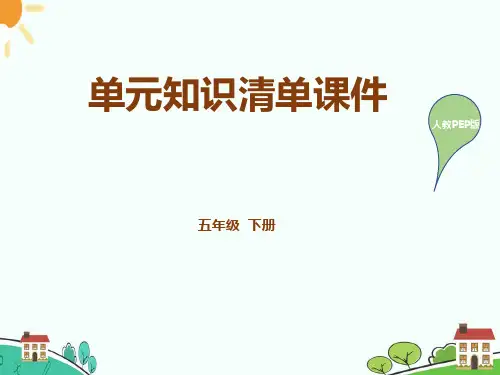
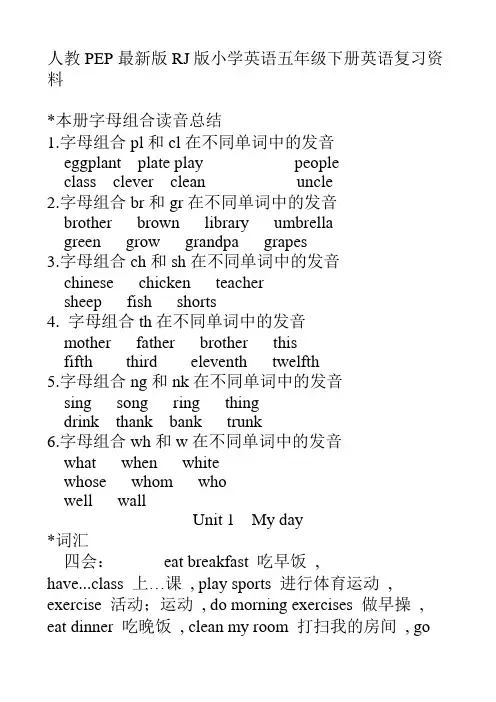
人教PEP最新版RJ版小学英语五年级下册英语复习资料*本册字母组合读音总结1.字母组合pl和cl在不同单词中的发音eggplant plate play peopleclass clever clean uncle2.字母组合br和gr在不同单词中的发音brother brown library umbrellagreen grow grandpa grapes3.字母组合ch和sh在不同单词中的发音chinese chicken teachersheep fish shorts4. 字母组合th在不同单词中的发音mother father brother thisfifth third eleventh twelfth5.字母组合ng和nk在不同单词中的发音sing song ring thingdrink thank bank trunk6.字母组合wh和w在不同单词中的发音what when whitewhose whom whowell wallUnit 1 My day*词汇四会:eat breakfast 吃早饭,have...class 上…课, play sports 进行体育运动, exercise 活动;运动, do morning exercises 做早操,eat dinner 吃晚饭, clean my room 打扫我的房间, go fora walk 散步, go shopping 去买东西;购物, take 学习;上(课)dancing 跳舞;舞蹈,take a dancing class 上舞蹈课三会:when 什么时候;何时, after 在(时间)后, start 开始, usually 通常地;惯常地, Spain 西班牙, late 晚;迟, a.m. 午前;上午, p.m. 午后;下午, why 为什么, shop 去买东西;购物, work 工作, last上一个的;刚过去的, sound 听起来好像, also 还;也, busy 忙的, need 需要, play 戏剧;剧本, letter 信, live 居住, island 岛, always 总是;一直, cave 山洞;洞穴, go swimming 去游泳, win 获胜*句子:1.询问作息时间的句型及其答语--When do you finish class in the morning ?你们上午的课到几点结束?--We finish class a t 1 o’clock.我们一点钟结束上午的课。
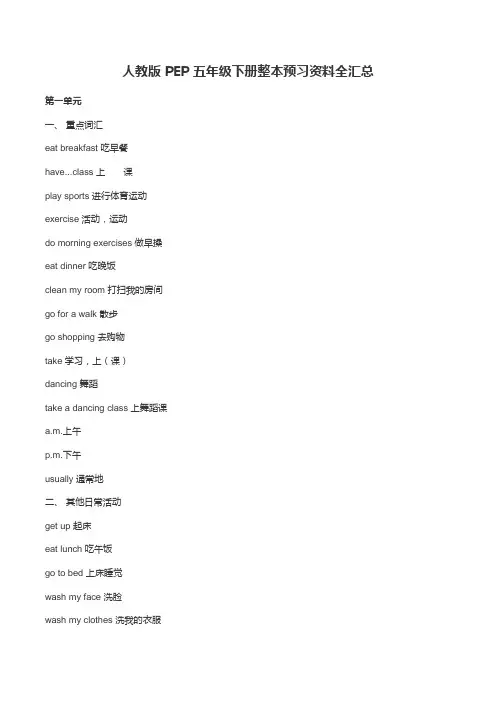
人教版 PEP 五年级下册整本预习资料全汇总第一单元一、重点词汇eat breakfast 吃早餐have...class 上······课play sports 进行体育运动exercise 活动,运动do morning exercises 做早操eat dinner 吃晚饭clean my room 打扫我的房间go for a walk 散步go shopping 去购物take 学习,上(课)dancing 舞蹈take a dancing class 上舞蹈课a.m.上午p.m.下午usually 通常地二、其他日常活动get up 起床eat lunch 吃午饭go to bed 上床睡觉wash my face 洗脸wash my clothes 洗我的衣服watch TV 看电视play ping-pong 打乒乓球play the pipa 弹琵琶go swimming 去游泳go running 去跑步do homework 做作业do kungfu 练武术play football 踢足球play basketball 打篮球三、语音cl→ [cl] :clean clock class cleverpl→[pl] :plate eggplant please play注意:cl 和pl 放在词尾与e 结合变为cle 和ple 时发音不同。
四、频度副词always 总是,一直(100%)usually 通常(80%)often 经常(60%)sometimes 有时(30%)五、疑问词why 为什么when 什么时候六、重点句型1、询问别人什么时候做某事的句型及回答。
句型结构:问:When do you+动词短语原形+其他?(你/你们什么时候做某事?)答:I/we(+频度副词)+动词短语原形+at+具体时间. (我/我们通常在几点做某事。
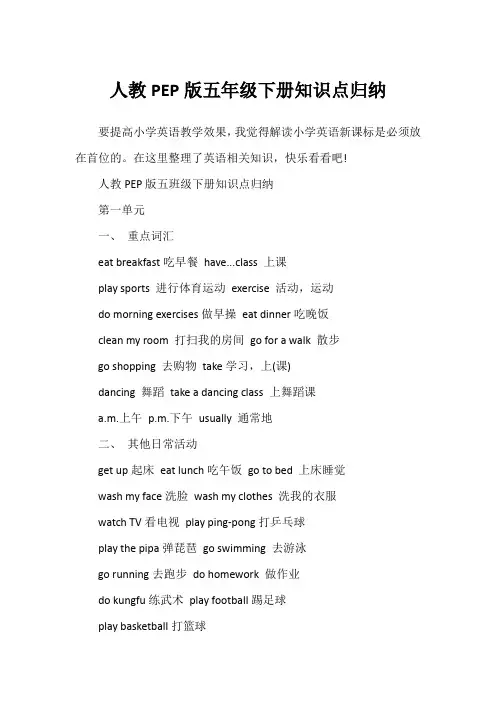
人教PEP版五年级下册知识点归纳要提高小学英语教学效果,我觉得解读小学英语新课标是必须放在首位的。
在这里整理了英语相关知识,快乐看看吧!人教PEP版五班级下册知识点归纳第一单元一、重点词汇eat breakfast吃早餐have...class 上课play sports 进行体育运动exercise 活动,运动do morning exercises做早操eat dinner吃晚饭clean my room 打扫我的房间go for a walk 散步go shopping 去购物take学习,上(课)dancing 舞蹈take a dancing class 上舞蹈课a.m.上午p.m.下午usually 通常地二、其他日常活动get up起床eat lunch吃午饭go to bed 上床睡觉wash my face洗脸wash my clothes 洗我的衣服watch TV看电视play ping-pong打乒乓球play the pipa弹琵琶go swimming 去游泳go running去跑步do homework 做作业do kungfu练武术play football踢足球play basketball打篮球三、语音cl [cl] :clean clock class cleverpl[pl] :plate eggplant please play注意:cl 和pl 放在词尾与e 结合变为cle 和ple 时发音不同。
四、频度副词always总是,一直(100%) usually通常(80%) often 常常(60%) sometimes有时(30%)五、疑问词why 为什么when 什么时候六、重点句型1、询问别人什么时候做某事的句型及回答。
句型结构:问:When do you+动词短语原形+其他?(你/你们什么时候做某事?) 答:I/we(+频度副词)+动词短语原形+at+具体时间. (我/我们通常在几点做某事。

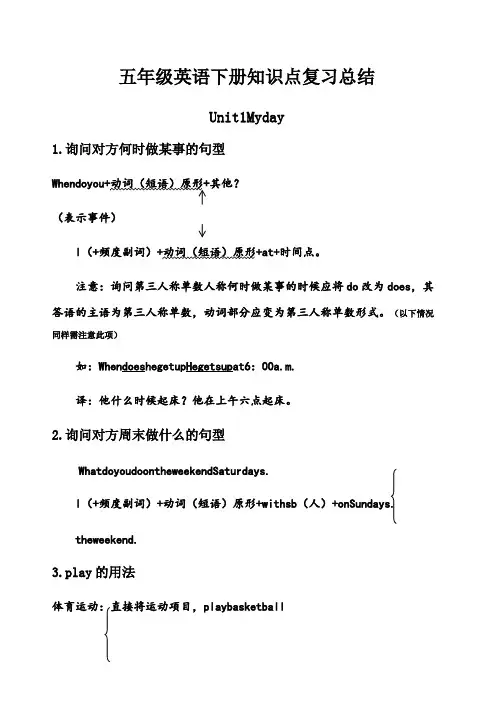
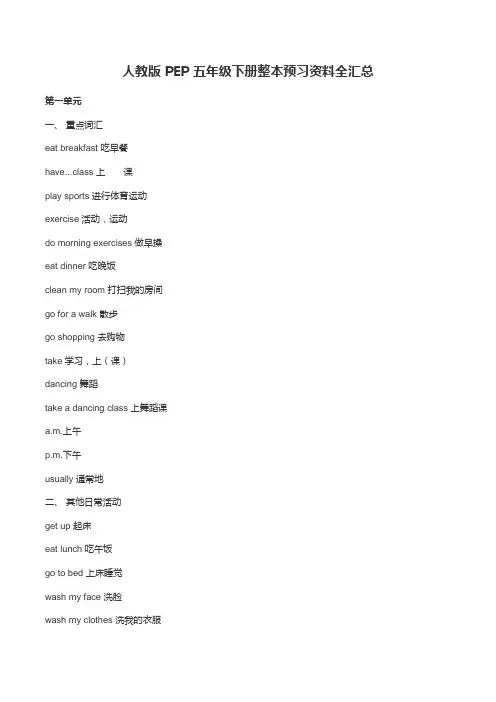
人教版 PEP 五年级下册整本预习资料全汇总第一单元一、重点词汇eat breakfast 吃早餐have...class 上······课play sports 进行体育运动exercise 活动,运动do morning exercises 做早操eat dinner 吃晚饭clean my room 打扫我的房间go for a walk 散步go shopping 去购物take 学习,上(课)dancing 舞蹈take a dancing class 上舞蹈课a.m.上午p.m.下午usually 通常地二、其他日常活动get up 起床eat lunch 吃午饭go to bed 上床睡觉wash my face 洗脸wash my clothes 洗我的衣服watch TV 看电视play ping-pong 打乒乓球play the pipa 弹琵琶go swimming 去游泳go running 去跑步do homework 做作业do kungfu 练武术play football 踢足球play basketball 打篮球三、语音cl→ [cl] :clean clock class cleverpl→[pl] :plate eggplant please play注意:cl 和pl 放在词尾与e 结合变为cle 和ple 时发音不同。
四、频度副词always 总是,一直(100%)usually 通常(80%)often 经常(60%)sometimes 有时(30%)五、疑问词why 为什么when 什么时候六、重点句型1、询问别人什么时候做某事的句型及回答。
句型结构:问:When do you+动词短语原形+其他?(你/你们什么时候做某事?)答:I/we(+频度副词)+动词短语原形+at+具体时间. (我/我们通常在几点做某事。

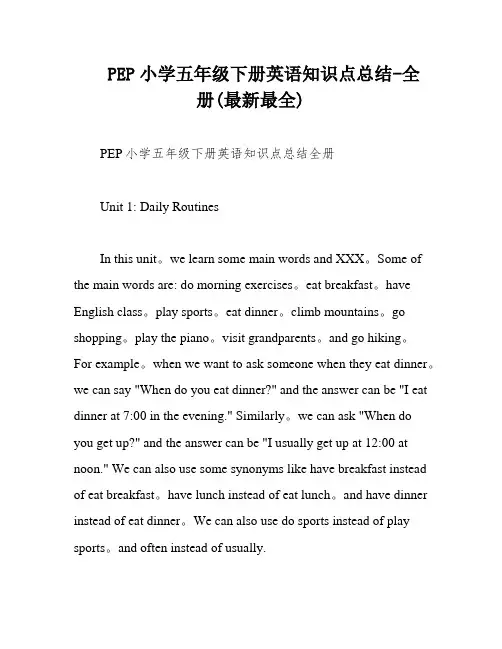
PEP小学五年级下册英语知识点总结-全册(最新最全)PEP小学五年级下册英语知识点总结全册Unit 1: Daily RoutinesIn this unit。
we learn some main words and XXX。
Some of the main words are: do morning exercises。
eat breakfast。
have English class。
play sports。
eat dinner。
climb mountains。
go shopping。
play the piano。
visit grandparents。
and go hiking。
For example。
when we want to ask someone when they eat dinner。
we can say "When do you eat dinner?" and the answer can be "I eat dinner at 7:00 in the evening." Similarly。
we can ask "When do you get up?" and the answer can be "I usually get up at 12:00 at noon." We can also use some synonyms like have breakfast instead of eat breakfast。
have lunch instead of eat lunch。
and have dinner instead of eat dinner。
We can also use do sports instead of play sports。
and often instead of usually.Unit 2: Seasons and ActivitiesIn this unit。
人教版PEP五年级下册整本预习资料全汇总第一单元一、重点词汇eat breakfast吃早餐have...class上······课play sports进行体育运动exercise活动,运动do morning exercises做早操eat dinner吃晚饭clean my room打扫我的房间go for a walk散步go shopping去购物take学习,上(课)dancing舞蹈take a dancing class上舞蹈课a.m.上午p.m.下午usually通常地二、其他日常活动get up起床eat lunch吃午饭go to bed上床睡觉wash my face洗脸wash my clothes洗我的衣服watch TV看电视play ping-pong打乒乓球play the pipa弹琵琶go swimming去游泳go running去跑步do homework做作业do kungfu练武术play football踢足球play basketball打篮球三、语音cl→[cl]:clean clock class cleverpl→[pl]:plate eggplant please play注意:cl和pl放在词尾与e结合变为cle和ple时发音不同。
四、频度副词always总是,一直(100%)usually通常(80%)often经常(60%)sometimes 有时(30%)五、疑问词why为什么when什么时候六、重点句型1、询问别人什么时候做某事的句型及回答。
句型结构:问:When do you+动词短语原形+其他?(你/你们什么时候做某事?)答:I/we(+频度副词)+动词短语原形+at+具体时间.(我/我们通常在几点做某事。
)例:When do you go to bed?(你什么时候上床睡觉?)I go to bed at9:00p.m.(我晚上九点上床睡觉。
)注意:当主语是第三人称单数(he,she,it,单个人名或单数名词)时,助动词do要变成does。
句型结构是:When does+主语(第三人称单数)+动词短语原形+其他?2、询问别人周末做什么的句型及回答。
句型结构:问:What do you do on the weekend?(你周末做什么?)答:I(+频度副词)+动词(短语)+其他。
例:What do you do on the weekend?(你周末做什么?)I usually read books.(我通常看书。
)注意:当主语是第三人称单数(he,she,it,单个人名或单数名词)时,助动词do要变成does。
句型结构是:What does+主语(第三人称单数)+do+on the weekend?第二单元一、重点词汇spring春天summer夏天autumn秋天winter冬天season季节picnic野餐go on a picnic去野餐pick摘pick apples摘苹果snowman雪人make a snowman堆雪人go swimming去游泳which哪一个best最because因为vacation假期二、其他1、形容天气的形容词:hot炎热的warm暖和的rainy多雨的windy多风的foggy有雾的cold寒冷的cool凉爽的sunny晴朗的cloudy多云的snowy下雪的2、由go构成的活动短语:go swimming去游泳go shopping去购物go boating去划船go skating去滑冰go hiking去远足go fishing去钓鱼三、语音br→[br]:brown library brother umbrellagr→[gr]:green grapes grandpa grow四、重点句型1、询问别人天气怎么样的句型及回答。
句型结构:问:What’s the weather like+时间+地点?(······天气怎么样?)答:It’s+表示天气的形容词.例:What’s the weather like in winter in Beijing?(北京冬天的天气怎么样)It’s cold and windy(有风而且寒冷。
)2、询问别人最喜欢的季节句型及回答。
句型结构:问:Which season do you like best?(你最喜欢的季节是哪一个?)答:I like+季节+best.或直接说季节名称。
同义句还有:What’s your favourite season?3、询问别人喜欢某个季节的原因的句型及回答。
句型结构:问:Why do you like+季节名称?或直接用“Why”来提问。
答:一般要用“because”引导的句子来说明理由,可以从天气相关的活动等方面来说。
例:(1)Why do you like spring?(你为什么喜欢春天?)Because I can go on a picnic.(因为我能去野餐。
)(2)Why do you like summer?(你为什么喜欢夏天?)Because I can go swimming.(因为我能去游泳。
)(3)Why do you like autumn?(你为什么喜欢秋天?)Because I can pick apples.(因为我能摘苹果。
)(4)Why do you like winter?(你为什么喜欢冬天?)Because I can make a snowman.(因为我能堆雪人。
)第三单元一重点词汇January一月February二月March三月April四月May五月June 六月July七月August八月September九月October十月November 十一月December十二月注意:1、月份的首字母一定要大写。
2、May没有缩写形式,September的缩写形式是“Sept”,其他月份单词的缩写形式都是由单词的前三个字母加“·”构成。
3、月份的缩写形式不用在句子中,只能单独使用。
4、表示“在几月”时,要在月份单词前面加介词in。
二、常用节假日名称New Year’s Day元旦(1.1)Tree Planting Day植树节(3.12)Easter复活节(每年春分月圆之后第一个星期日)April Fool’s Day愚人节(4.1)May Day劳动节(5.1)Mother’s Day母亲节(五月第二个周日)Children’s Day儿童节(6.1)Father’s Day父亲节(六月第三个周日)Teacher’s Day教师节(9.10)National Day国庆节(10.1)Mid-Autumn Day中秋节(农历八月十五)Thanksgiving Day感恩节(11月第4个周四)Christmas圣诞节(12.25)summer vacation暑假(July and August)winter vacation寒假三、语音ch→[ts]:China chicken lunch teachersh→[s]:sheep fish shirt shorts四、活动名称sports meet运动会Easter party复活节聚会school trip学校旅行Chinese test语文测试singing contest歌咏比赛birthday party生日聚会五、介词in、on、at的用法。
1、in+上午/下午/晚上/月份/季节/年份。
如:in the morning,in April,in winter,in20152、on+具体的某一天。
如:on Monday,on April3rd,on Friday morning3、at+具体的时间点或与其他词构成固定搭配。
如:at6:00,at noon六、重点句型1、问答某个活动或节日在几月份的句型及回答。
句型结构:问:When is+the+活动或节日名称?(注意:节日开头字母要大写)答:It’s in+月份.例:(1)When is the trip this year?(今年的旅行在什么时候?)It’s in October.(在十月)(2)When is Christmas?(圣诞节在什么时候?)It’s in December.(在十二月。
)2、询问别人将要做什么的句型及回答。
句型结构:问:What will you do+其他?答:I will...=I’ll...例:What will you do for your mum on Mother’s Day?(母亲节你将为你妈妈做什么?)I’ll give her some flowers.(我将送给她一些花。
)3、表达“我们将要···”的句型。
We’ll/We will+动词原形.这是一个一般将来时的句子,表示将来某个时间要发生的动作或事情。
例:We’ll have a school trip.(我们将有一次学校旅行。
)We’ll have a singing contest.(我们将有一次歌咏比赛。
)We’ll take a dancing class.(我们将要上一节舞蹈课。
)第四单元一、重点词汇first(1st)第一second(2nd)第二third(3rd)第三fourth(4th)第四fifth(5th)第五sixth(6th)第六seventh(7th)第七eighth(8th)第八ninth(9th)第九tenth(10th)第十eleventh(11th)第十一twelfth(12th)第十二thirteenth(13th)第十三fourteenth(14th)第十四fifteenth(15th)第十五sixteenth(16th)第十六seventeenth(17th)第十七eighteenth(18th)第十八nineteenth(19th)第十九twentieth(20th)第二十twentieth-first(21th)第二十一twentieth-second(22nd)第二十二twentieth-third(23rd)第二十三thirtieth(30th)第三十二、用序数词表示具体的日期在英语中,“几月几日”可以先说“月”,再说“日”,其中“日”要用序数词。
如果要表示某年某月某日,通常按照“月、日、年”的顺序。
例如:March3rd June1st,2014三、语音th→/θ/:three thin thirteen mathsth→/ð/:this that mother brother四、基数词变序数词的口诀记忆基变序有规律,结尾加上th;一二三特殊记,结尾各是st,nd,rd;八减t九去e,f来把ve替;y改为ie,结尾仍有th;若是遇到几十几,只变个位就可以。